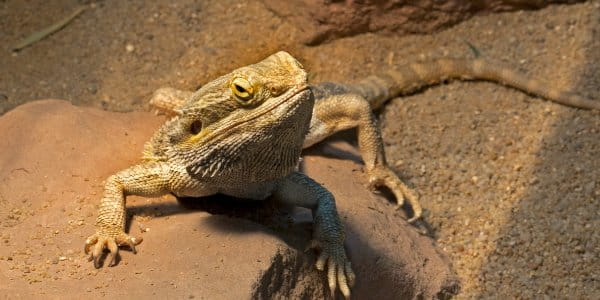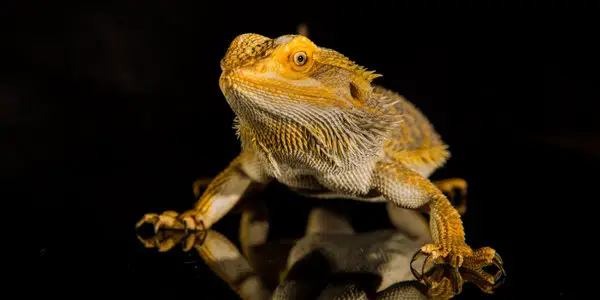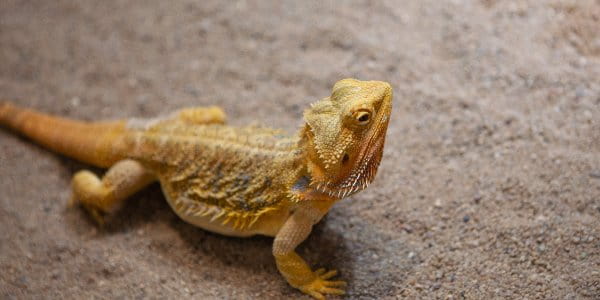Bearded dragons are both unique animals and beloved pets with omnivorous diets. Bearded dragon owners need to know ahead of time about any dietary concerns. One concern that might come up is, “How long exactly can a bearded dragon go without eating?”
Depending on the age of your bearded dragon, they can go without food for nearly two months. However, even though they can go this far, you should always check to ensure that they’re not suffering from any health ailments.
In this article, I’ll explain why bearded dragons sometimes refuse to eat, their diets, and how to help them maintain healthy eating habits. After reading this article, you’ll have a solid knowledge of how best to feed your dragon and tackle specific maladies they suffer.
Why Do Bearded Dragons Sometimes Refuse To Eat?
As mentioned above, the age of your bearded dragon determines how long they can last without food. Be advised that while some bearded dragons can do this for an extended time, this should always be seen as a warning sign.
Illnesses, change of living environment, brumation, and any changes in diet are typical reasons for bearded dragons refusing to eat. To prevent potential periods of non-eating, always be sure that you’re aware of your pet’s health, environment, and sudden changes in behavior.
When a bearded dragon adapts to a new living space, it might take time to adjust and feel safe properly. This is normal, but you should always keep an eye on them in case their stress levels reach a high level.
When choosing food for your dragon, something to keep in mind is that dry food isn’t a good option. While dry food might initially seem less costly and more convenient, bearded dragons need fresh food.
For this reason, you’ll always want to give them veterinarian-approved insects and vegetables. To ensure that your food choices are safe for your dragon, consult with your veterinarian beforehand.
Besides needing the right kind of food, bearded dragons might refuse to eat if they’re entering brumation, a unique reptile behavior.
Understanding Brumation
If your bearded dragon suddenly enters deep sleep, fear not because this is them entering brumation.
Brumation might be an unfamiliar term for many people. This is synonymous with hibernation, though brumation is exclusive to reptiles. There are critical differences between the two words to keep in mind.
As World Atlas explains, while hibernation occurs specifically in the winter, brumation can happen at any time of the year. This might throw off bearded dragon owners who don’t expect their pets to undergo this natural process.
Bearded dragon owners need to be aware of brumation because these reptiles experience it more than any others. Brumation can come on with little to no warning and might throw off an unprepared bearded dragon owner.
Brumation can be particularly jarring because the bearded dragon stops moving and functioning. It doesn’t help that bearded dragons won’t respond to attempts to wake them, like being touched during brumation. At first glance, it might even look like they’ve died.
Remember that while brumation can be alarming, it’s completely natural. Your bearded dragon will potentially enter brumation during the winter because of incoming colder temperatures. They might also experience shorter occurrences of brumation throughout the year.
Your bearded dragon might come out of brumation periods to eat or drink, then return to sleeping. This is also a regular occurrence.
Before your pet has a chance to enter brumation, check to be sure that they’ve been eating correctly and have plenty of fat to last the period. This will guarantee a safe sleep.

Bearded Dragon Diet
Because bearded dragons are omnivores, they eat a mix of both insects and vegetables. All bearded dragon owners should keep in mind that even though they’re omnivores, these reptiles can’t safely consume just any insect or vegetable.
To help bearded dragon owners give their pets safe diets, you need to know which foods are safe to feed your dragon. This includes worms, crickets, and roaches as their insect diet. In terms of plants, bearded dragons can eat several kinds, including squashes, carrots, and celery.
Understanding what your bearded dragon prefers to eat will depend on their age. Young bearded dragons prefer bugs, while older ones will prefer vegetables.
While it might be tempting, never feed your bearded dragon a bug you found crawling around your living space. Despite the seeming convenience, you won’t know where the bug came from and what toxic chemicals it might’ve encountered.
Of course, you also want to be sure that it’s small enough for them to eat no matter what food you choose. Otherwise, your bearded dragon will either have a hard time consuming it or might avoid it altogether. Always be sure that their food is easy to eat.
Foods You Should Never Give to Your Bearded Dragon
You need to avoid certain foods at all costs when deciding on what to give to your pet. Some insects, in particular, can be harmful to bearded dragons.
This list includes glowing insects like fireflies and insects found outside of a safe food distributor. Fireflies will harm your bearded dragon because of their unique biology. Regular insects that can be found everywhere can carry chemical traces and other contaminants.
In terms of vegetables, spinach is one always to avoid. While healthy for humans, the calcium content in spinach doesn’t sit well with bearded dragons and leads to digestive issues.
Also, never give your bearded dragon wildflowers or vegetables found out in the open. Unfortunately, many seemingly innocent plants are poisonous to bearded dragons. These include wild daffodils and tulips, among others.
As a rule of thumb, unless you know the food option is veterinarian-approved, don’t consider giving it to your bearded dragon.

9 Warning Signs of Sick Bearded Dragon
- Diarrhea
- Constipation
- Energy levels
- Lack of movement
- Lose their appetite
- Coughing or wheezing
- Weight loss
- Eye issue such as sunken eyes.
- Discoloration
Your bearded dragon refusing to eat correctly could be the first warning sign that they’re ill and potentially in need of treatment. This will become further evident if you see clear proof of digestive issues, such as diarrhea.
Digestive Issues in Bearded Dragons
Diarrhea can be caused by bearded dragon eating the wrong food or extreme stress levels. Unfortunately, they can also suffer from constipation which can be another sign of poor dietary habits.
Your first priority is to check what you’re feeding them for these digestive issues. You may need to switch to a different food source if it’s apparent that the food is what’s making them ill.
Something else to be aware of is that paralysis can occur when bearded dragons eat food too large for their bodies. When they consume overly large portions of food, the pressure can drastically impact their spinal cord and have potentially fatal results.
Ensure that you’re feeding the right-sized amount of food to your dragon to avoid this. Their food should always be small enough to swallow easily.
Other Bearded Dragon Dietary Issues
While vitamins are suitable for humans and pets, moderation is still essential. Because bearded dragons consume a lot of vegetables as part of their diet, they can accidentally overdose on specific vitamins.
This mainly includes Vitamin A, found in carrots and similar vegetables. When bearded dragons overdose on Vitamin A, they suffer swelling in several places, most notably the eyes.
To avoid this, avoid giving your dragon a Vitamin A supplement unless instructed to do so by your veterinarian.
You want to give your bearded dragon the healthiest diet possible. But it’s also crucial that you ensure their diet is well balanced. This way, you’ll prevent them from overdosing or suffering a deficiency in certain vitamins.
Other Indicators of Poor Health in Bearded Dragons
Besides indicators of a digestive illness, bearded dragons will also display critical red flags that they’re suffering from ailments.
Be on the lookout for telltale signs of dehydration in your bearded dragon. Suppose you notice a sudden drop in energy levels and lack of movement in your pet. In that case, these are some of the most prominent warnings that they’re not taking in enough fluid.
If necessary, consider using small tools like an eyedropper to guarantee that your dragon is getting enough water. This will make them take in fluid if they’re too lethargic to do it themselves.
You must act quickly upon noticing signs of dehydration. When bearded dragons suffer from a lack of fluid, they can lose their appetite and compound the issue.
Never hesitate to contact your veterinarian if you’re concerned that this is a persisting or recurring issue.

Conclusion
While bearded dragons refusing to eat correctly is abnormal behavior, steps can still be taken to guarantee their wellbeing. Always keep an eye on their daily eating habits to determine if they’re unhappy with their food or if there’s an underlying problem.
So long as you’re preemptively aware of warning signs to watch out for, you’ll guarantee your bearded dragon’s dietary health and safety.
FAQs
How Long Can Adult Bearded Dragons Go Without Eating?
Up to 4 weeks.
How Long Can Juvenile Bearded Dragons Go Without Eating?
For juvenile dragons and baby bearded dragons, don’t leave them without eating for more than 3 days.
Should You Force Feed Your Bearded Dragon?
If your bearded dragon starts to show signs of dehydration you must start force feeding them to avoid getting your bearded dragon sick.
